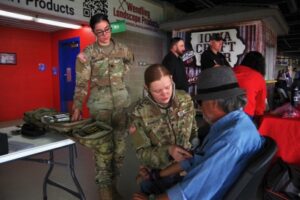
Spc. Billi jo Henkleman and Spc. Jasmine Schneider, combat medics with the 134th Ambulance Company, provide medical support for the the Fifth Season Stand Down event in Cedar Rapids, IA, last fall. Homeless veterans are at a greater risk of dementia, according to a new study. U.S. Army National Guard photo by Sgt. 1st Class Jason Everett
BEDFORD, MA — Veterans who experience housing instability have an elevated risk of developing Alzheimer’s disease or a related dementia compared to those with stable housing, according to a recent study.
The study published in the Journal of the American Geriatrics Society examined the “rate of diagnosis for Alzheimer’s disease or a related dementia for veterans experiencing homelessness and housing instability compared to veterans with stable housing over a nine-year period,” the authors explained.1
Study authors were affiliated with VA Bedford, MA, Healthcare System; the Providence, RI, VAMC; and VA’s National Center on Homelessness Among Veterans in Tampa, FL.
“Nearly 85,000 U.S. veterans experienced homelessness during 2020, but thousands more veterans are experiencing housing instability and are at-risk for homelessness each year,” according to the authors. “Many of the veterans experiencing homelessness are aging and also have complex medical, psychiatric and substance use disorders, with almost 60% of veterans experiencing homelessness being 50 years or older,” the study reported.
The combination of “homelessness with older age puts veterans at increased risk for age-related disorders, including Alzheimer’s disease and related dementias,” the authors suggested.
Participants in the matched cohort study, who were followed from Jan. 1, 2011, to Dec. 31, 2019, were 44,194 veterans experiencing homelessness or housing instability and 44,194 veterans with secure housing. Using the VA Corporate Data Warehouse, the authors identified veterans who had a VA healthcare encounter in 2010 and excluded veterans based on certain criteria, such as being younger than 50 years old, the study reported. None of the veterans had a diagnosis of Alzheimer’s disease and related dementias before 2011, according to a press release from Wiley, a leading publisher.
Among the participants, 95% were men, and 67% were white. The veterans had an average age of 63 years old, the study authors reported.
53% More Likely
The study found that “veterans with housing instability were 53% more likely to receive a diagnosis of Alzheimer’s disease or a related dementia than those with stable housing,” according to the press release. Also, veterans who had stable housing at the start of the study and became homeless during the study “had a higher rate of Alzheimer’s disease or a related dementia diagnosis (hazard of 1.53, 95% confidence interval (1.50, 1.59)) than veterans with housing stability,” the study explained.
In addition, the authors reported that, midway through the study in 2015, “7.23% of housing insecure veterans and 3.66% of housing stable veterans received a diagnosis of Alzheimer’s disease and related dementias,” according to the press release.
Based on their results, study authors suggested that “veterans with Alzheimer’s disease and related dementias are more likely to eventually experience homelessness, which has also been found in previous studies.”
The study’s findings underscore “the need to rethink supportive housing models,” the researchers pointed out.
“Our findings call for greater supports for independent living for veterans experiencing housing instability with Alzheimer’s disease and related dementias—such as using federally funded housing vouchers for non-traditional options like assisted living facilities,” Jill Roncarati, ScD, a researcher at the VA Bedford Healthcare System, said in the press release.
The authors recommended that “health systems and providers should consider cognitive screening among people experiencing housing insecurity.” To better support veterans experiencing Alzheimer’s disease and related dementias, “existing permanent supportive housing programs should consider approaches to modify wraparound services,” the researchers suggested.
“Permanent supportive housing with wraparound services including medical, nursing, home health and social services could delay the need for nursing home care,” the authors explained.
Much of the care for individuals with Alzheimer’s disease and related dementias is often provided by family members, either in the community or home. If a safe home environment isn’t available, populations experiencing housing insecurity “may need to rely on nursing home care sooner than stably housed populations, which is costly,” the authors pointed out.
Future studies should “consider the role of social determinants of health variables, such as education and direct access to primary care, which are risk factors for Alzheimer’s disease and related dementias and factors that affect who receives a diagnosis,” the authors recommended.
The authors also noted that “interventions to support homeless individuals versus those with housing instability will likely be different.” For instance, “programs for veterans experiencing housing instability might focus on helping these veterans to age safely in their current home. However, for homeless individuals with Alzheimer’s disease and related dementias, it would be important to find appropriate housing with support, though this would be challenging because of the scarcity of resources,” according to the authors.
A limitation of the study is that authors might have misclassified veterans with infrequent VA encounters, the study reported. In the study, veterans without a primary care visit were excluded, so this “could possibly include people with Alzheimer’s disease and related dementias who haven’t gone to primary care and therefore haven’t received a diagnosis of Alzheimer’s disease and related dementias,” according to the study. Also, the severity of the diagnosis of Alzheimer’s disease and related dementias and the level of veterans’ functional independence were unknown, the study authors added.
- Roncarati JS, DeVone F, Halladay C, Tsai J, Jutkowitz E. Risk of dementia among veterans experiencing homelessness and housing instability. J Am Geriatr Soc. 2023 Dec 6. doi: 10.1111/jgs.18680. Epub ahead of print. PMID: 38053404.

